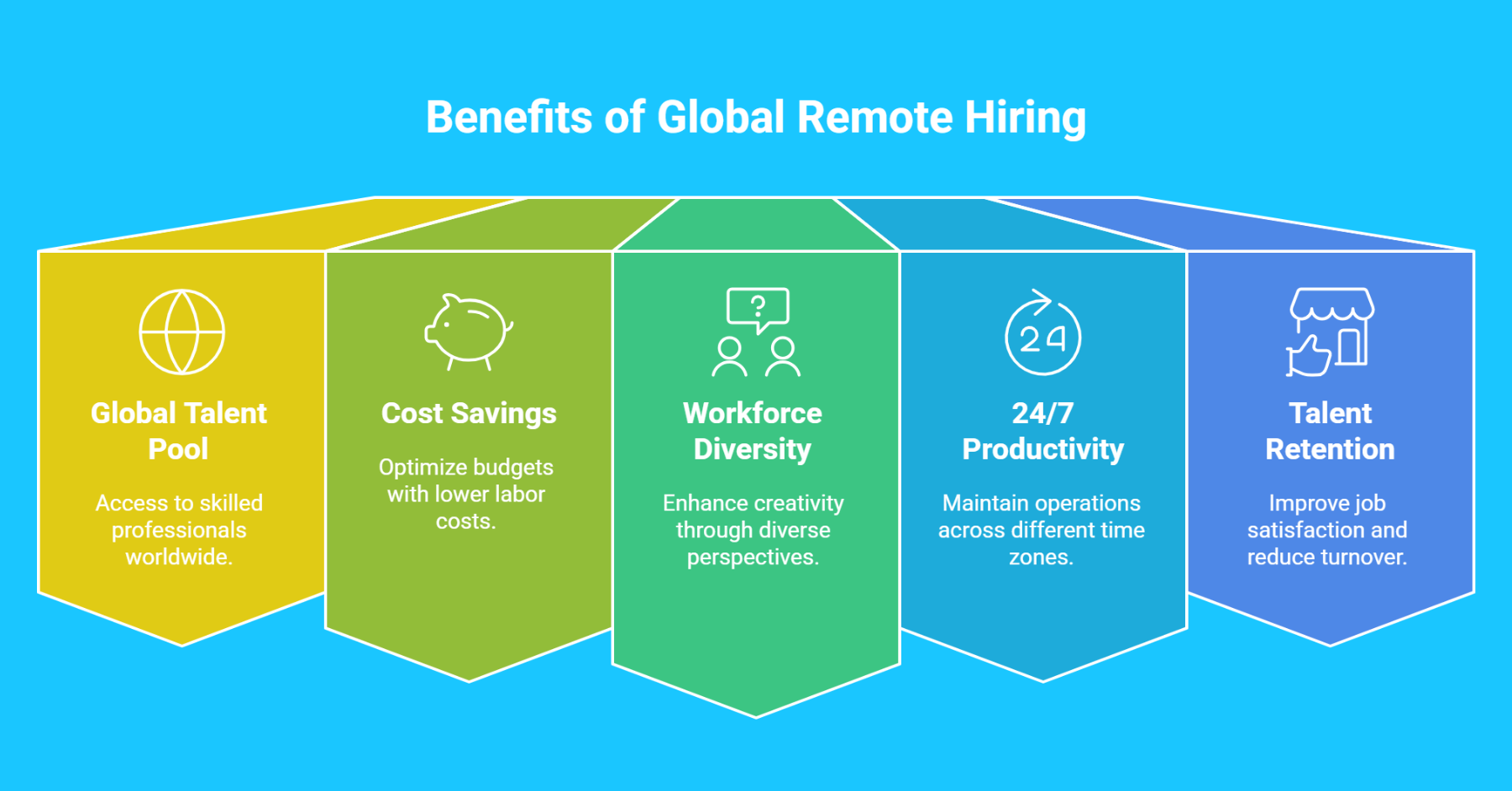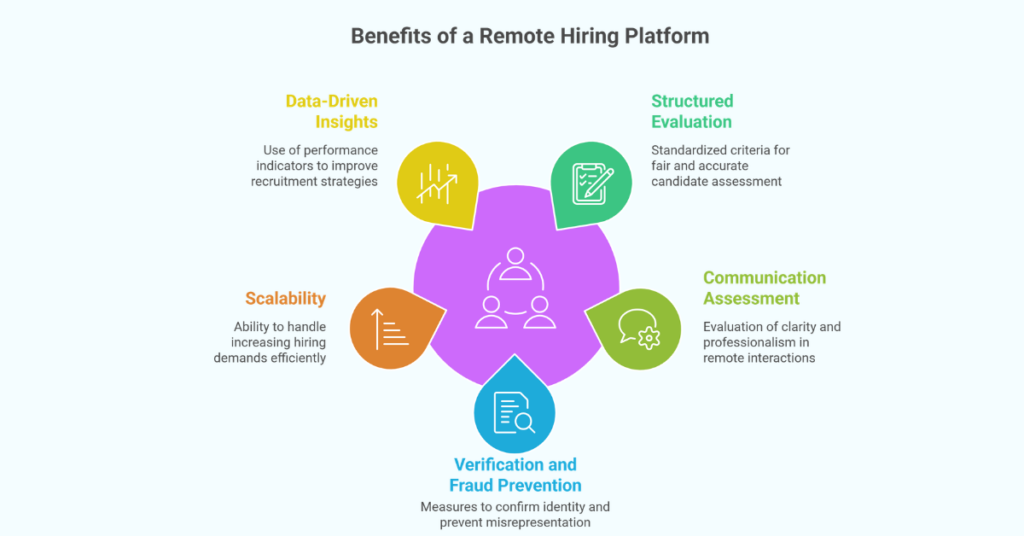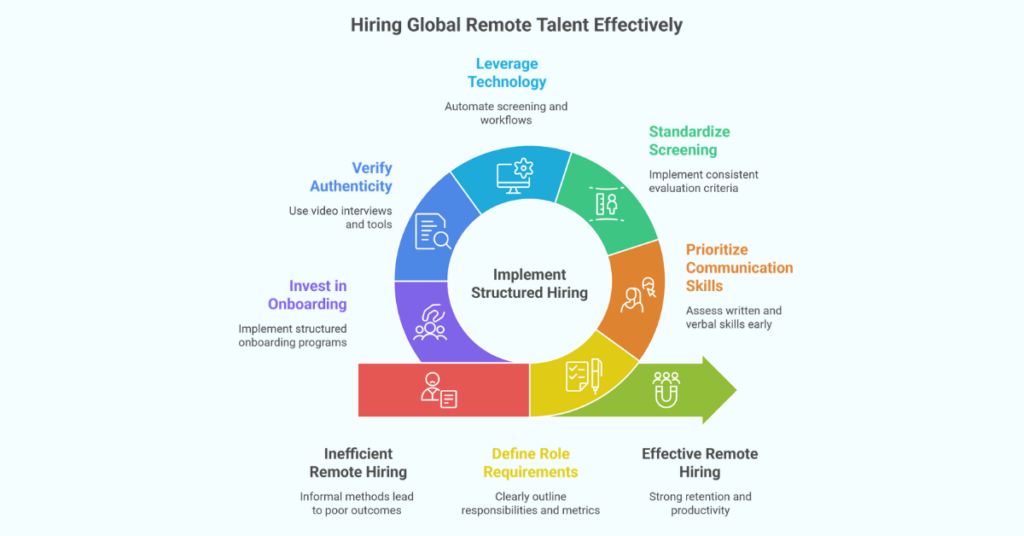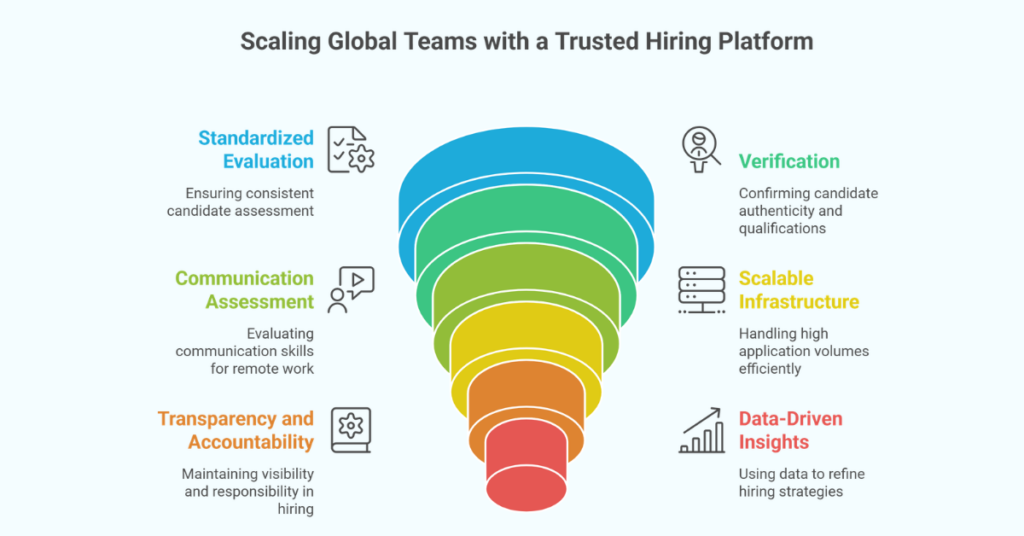“Global remote hiring expands talent horizons, enabling businesses to access top professionals worldwide while optimizing costs and boosting efficiency.”
The modern workforce is no longer bound by geographical limitations. Global remote hiring has become a game-changer for companies looking to attract top talent from around the world. As businesses embrace international hiring, they unlock access to diverse skill sets, reduce operational costs, and improve workforce flexibility. However, hiring remote employees worldwide comes with its own challenges, including legal compliance, cultural adaptation, and payroll management.
For companies to succeed in global remote hiring, they must adopt effective strategies that ensure smooth recruitment, compliance with international labor laws, and efficient team management. Understanding cultural differences, navigating tax regulations, and choosing the right hiring platforms are critical to building a strong international workforce.
This article explores the benefits and challenges of hiring remote employees globally, provides insights into managing cultural differences, discusses the legal aspects of international employment, and highlights the best tools for seamless global hiring. Whether you’re a startup expanding into international markets or a large enterprise building a global team, these strategies will help you master global remote hiring successfully.
The Benefits of Global Remote Hiring
Expanding hiring efforts beyond national borders offers businesses significant advantages.
-
Access to a Global Talent Pool
Global remote hiring allows companies to recruit top-tier professionals from different countries, ensuring access to specialized skills and expertise that may not be available locally. -
Cost Savings on Salaries and Operations
Hiring remote employees in regions with lower labor costs helps businesses optimize salary budgets while reducing office space and overhead expenses. -
Increased Workforce Diversity and Innovation
A globally distributed workforce brings fresh perspectives, diverse problem-solving approaches, and increased creativity, enhancing innovation and business growth. -
24/7 Productivity and Business Continuity
Hiring employees across different time zones enables companies to maintain operations around the clock, ensuring better customer support and faster project execution. -
Better Talent Retention and Employee Satisfaction
Remote employees often experience improved work-life balance and job satisfaction, leading to higher retention rates and reduced turnover costs.
Challenges of Hiring Remote Employees Internationally
Despite the benefits, companies must navigate several challenges when hiring international remote employees.
-
Navigating Legal and Tax Compliance
Every country has unique employment laws, tax requirements, and labor regulations. Companies must ensure compliance with local employment contracts, tax obligations, and work permits. -
Managing Cultural Differences
Cultural variations in work ethics, communication styles, and expectations can impact collaboration. Understanding these differences and fostering an inclusive work environment is essential. -
Handling Payroll and Payment Processing
Paying international employees requires businesses to navigate currency exchanges, taxation, and compliance with local banking regulations. Finding the right payroll solution simplifies this process. -
Ensuring Team Communication and Collaboration
Remote teams spread across different time zones need effective communication tools and structured workflows to stay connected and work efficiently. -
Security and Data Protection Compliance
Hiring internationally means dealing with varying data privacy laws, such as GDPR. Companies must implement strong cybersecurity measures to protect sensitive data.
Strategies for Navigating Cultural Differences in Global Hiring
Creating an inclusive and collaborative global workforce requires cultural awareness and adaptation.
-
Conduct Cultural Sensitivity Training
Educating teams on different cultural norms and communication styles fosters better collaboration and reduces misunderstandings. -
Establish Clear Communication Guidelines
Setting expectations for communication frequency, preferred platforms, and response times helps remote teams function smoothly across time zones. -
Encourage Cross-Cultural Team Bonding
Virtual team-building activities, informal check-ins, and online social events strengthen relationships and create a sense of community among remote employees. -
Adapt Leadership and Management Styles
Different cultures have varying expectations regarding leadership. Managers should adopt flexible approaches that respect diverse perspectives and work preferences. -
Celebrate Global Holidays and Events
Acknowledging and celebrating cultural holidays promotes inclusivity and strengthens team engagement in an international workforce.
Legal and Tax Considerations in Global Remote Hiring
Compliance with international labor laws and tax regulations is critical when hiring remote employees worldwide.
-
Understand Employment Laws in Each Country
Labor laws vary by country, covering aspects such as minimum wage, work hours, benefits, and termination policies. Employers must align with local regulations. -
Determine the Right Hiring Model
Businesses can hire remote employees as full-time workers, independent contractors, or through employer-of-record (EOR) services to ensure compliance. -
Comply with Tax Regulations
Companies must decide whether to withhold income tax, provide tax forms, or require employees to handle their own tax filings based on regional tax laws. -
Use Global Payroll and Compliance Platforms
Payroll platforms like Remote or Deel simplify international payroll processing, tax compliance, and benefits administration. -
Draft Legally Compliant Remote Work Contracts
Employment contracts should outline job expectations, salary details, tax responsibilities, intellectual property rights, and dispute resolution terms.
Tools and Platforms for Seamless Global Remote Hiring
The right hiring and collaboration tools ensure smooth recruitment and workforce management.
-
Global Job Boards and Hiring Platforms
Platforms like Remote Recruit, LinkedIn, and Toptal help companies source and connect with international talent. -
Applicant Tracking Systems (ATS)
ATS software automates candidate screening, interview scheduling, and onboarding, streamlining global recruitment processes. -
Payroll and Payment Solutions
Platforms like Payoneer and Wise enable secure, efficient cross-border salary payments for remote employees. -
Communication and Collaboration Tools
Video conferencing tools like Zoom, project management software like Asana, and messaging apps like Slack keep remote teams connected and productive. -
Time Tracking and Productivity Management
Tools like Time Doctor and Hubstaff help employers monitor work hours, manage productivity, and streamline payroll for international remote teams.
A Simple Guide to Concepts on Global Remote Hiring
Hiring remote employees globally requires planning, compliance, and the right tools.
-
What is Global Remote Hiring?
The process of recruiting employees from different countries to work remotely for a company. -
Why is Global Remote Hiring Important?
It expands talent access, reduces hiring costs, and enables businesses to operate efficiently across different time zones. -
How to Hire Remote Employees Internationally?
Use digital hiring platforms, ensure compliance with labor laws, and adopt global payroll solutions for seamless payments. -
Key Benefits of Global Hiring:
- Increased talent diversity
- Cost-effective workforce solutions
- Enhanced innovation and creativity
- Round-the-clock business operations
-
How to Manage a Global Remote Workforce?
Implement structured communication, invest in collaboration tools, and foster an inclusive company culture.
Solutions Provided by Remote Recruit
Remote Recruit simplifies global remote hiring by offering comprehensive hiring solutions for businesses and job seekers.
For employers, Remote Recruit provides AI-powered talent sourcing, compliance support, and international payroll solutions. Companies can seamlessly hire remote employees worldwide while ensuring legal and financial compliance.
For job seekers, Remote Recruit connects professionals with top remote job opportunities, offering career guidance, resume optimization, and interview preparation. Candidates can find global job listings tailored to their skills and experience.
Conclusion
Global remote hiring is transforming the workforce, enabling businesses to build diverse, skilled, and cost-effective teams. By overcoming legal, cultural, and logistical challenges, companies can successfully expand their talent reach and enhance productivity. Leveraging the right hiring strategies and digital tools ensures smooth recruitment and seamless workforce management.
Remote Recruit provides end-to-end solutions for businesses hiring international talent and job seekers looking for global remote opportunities. Companies embracing global remote hiring gain a competitive advantage in today’s fast-evolving job market.
Start hiring top global talent today with Remote Recruit. Sign up now and build a high-performing remote workforce with ease!
Frequently Asked Questions (FAQs)
1. What are the key benefits of global remote hiring?
It provides access to diverse talent, reduces hiring costs, and enhances workforce flexibility.
2. How can companies ensure compliance when hiring remote employees internationally?
By understanding local labor laws, using EOR services, and implementing global payroll solutions.
3. What tools help manage remote employees globally?
Communication tools like Slack, payroll platforms like Payoneer, and project management software like Asana.
4. How do companies handle international payroll for remote workers?
By using global payroll services that handle tax compliance and secure payments.
5. How does Remote Recruit help with global hiring?
Remote Recruit connects businesses with top global talent while ensuring legal compliance and efficient hiring.
